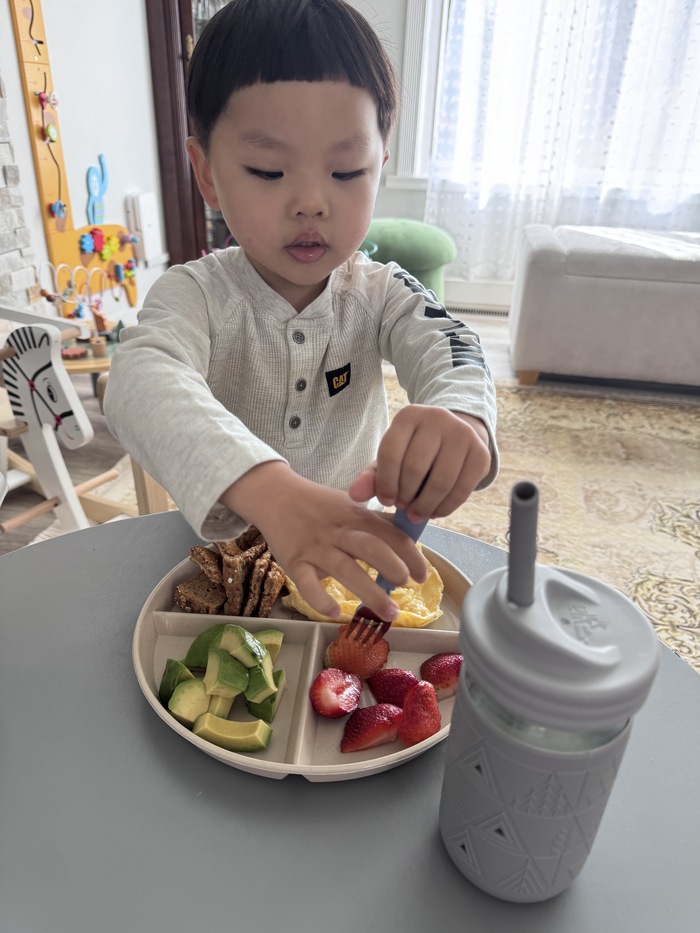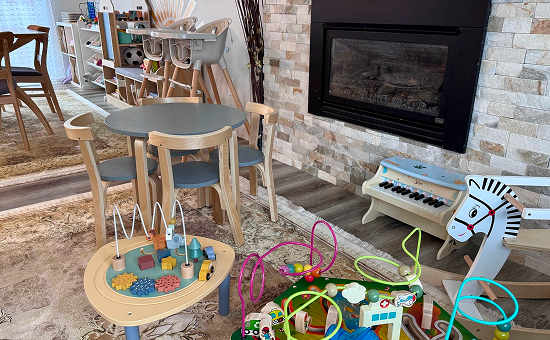When your toddler smears mashed potatoes across the table or tosses peas onto the floor, it might feel like mealtime has turned into a playground. But this messy behavior is more than just chaos—it’s a natural part of your child’s development. Toddlers are curious explorers, and food provides a rich, sensory experience that engages their senses and sparks learning. Playing with food is not only normal but also beneficial for their growth.
In this article, we’ll explore why toddlers play with food, the developmental benefits of this behavior, and how parents and daycare providers can support it. From sensory exploration to building healthy eating habits, you’ll discover practical ways to embrace this phase while fostering your child’s development.
Benefits of Playing with Food for Toddlers
Food play is more than just a mess—it’s a powerful tool for learning. Here’s how it supports your toddler’s growth:
Sensory Exploration and Cognitive Growth
Toddlers learn about the world through their senses. Squishing, smelling, and tasting food helps them understand textures, temperatures, and flavors. For example, squeezing a soft banana or feeling the crunch of a carrot engages their sense of touch and builds cognitive connections.
This sensory play is critical in early childhood, as it stimulates brain development and encourages curiosity. In a Bothell daycare setting, caregivers often incorporate sensory activities like food play to promote exploration in a structured environment.
Strengthening Fine Motor Skills
Playing with food helps toddlers develop fine motor skills, which are essential for tasks like writing, buttoning clothes, or using utensils. When a child pinches peas or scoops yogurt, they practice hand-eye coordination and dexterity.
Research shows that children who engage in hands-on activities, such as food play, develop stronger motor skills by age three. Daycare providers often encourage these activities during mealtimes to support physical development in a fun, engaging way.
Building a Positive Relationship with Food
Allowing toddlers to explore food through play can foster a healthy relationship with eating. When children are free to touch and taste at their own pace, they’re more likely to develop positive associations with food. This can reduce picky eating and encourage adventurous eating habits over time.
In child care settings, caregivers often model positive food interactions, helping children feel comfortable trying new foods. This approach supports long-term healthy eating habits.

How Parents Can Support Food Play
As a parent, you can turn food play into a learning opportunity while keeping mealtimes manageable. Here are some strategies:
Creating a Safe Environment for Exploration
Set up a space where messes are okay. Use a highchair with a tray or place a mat under the table for easy cleanup. Offer small portions of safe, age-appropriate foods like soft fruits, cooked vegetables, or yogurt to encourage exploration without waste.
Introducing a Variety of Foods
Expose your toddler to different textures, colors, and flavors. For example, offer smooth purees alongside crunchy crackers or slippery noodles. This variety stimulates sensory development and makes mealtime exciting.
Setting Reasonable Boundaries
While food play is beneficial, setting boundaries helps maintain structure. For instance, teach your child that throwing food is not okay, but squishing or spreading it on their tray is fine. Clear expectations create a balance between exploration and respect for mealtime routines.
When Should You Be Concerned About Food Play?
While food play is typically harmless, there are times when it may signal an issue. If your toddler consistently refuses to eat, only plays with food without tasting it, or shows signs of sensory sensitivities (e.g., extreme aversion to certain textures), it may be worth consulting a pediatrician or occupational therapist.
In most cases, food play is a normal phase that fades as children grow. However, if you’re concerned, a daycare Bothell provider or child development specialist can offer guidance tailored to your child’s needs.
Practical Tips for Parents and Daycare Providers
Here are actionable tips to make food play a positive experience:
- Start Small: Offer one or two foods at a time to avoid overwhelming your toddler.
- Join the Fun: Sit with your child and model food exploration, like dipping veggies in hummus.
- Be Patient: Messes are part of the process. Focus on the learning, not the cleanup.
- Involve Daycare Providers: Share your approach with your Bothell daycare team to ensure consistency between home and daycare.
- Celebrate Progress: Praise your child for trying new foods or using a spoon, reinforcing positive behavior.
Introducing Kido Heaven: Supporting Your Child’s Growth
At Kido Heaven, we understand the importance of nurturing your child’s development through everyday experiences like mealtime. Our daycare Bothell programs are designed to support sensory exploration, motor skill development, and healthy eating habits in a safe, engaging environment. With experienced caregivers and a child-centered approach, we partner with parents to help your toddler thrive. Visit kidoheaven.com to learn more about our Bothell daycare and child care bothell services.
Why KidoHeaven Stands Out
✅ Licensed in Washington State
✅ Aligned with Early Achievers standards
✅ Working Connections subsidy accepted
✅ Daily updates via Brightwheel
✅ Located in Bothell, serving Mill Creek, Lynnwood & nearby areas
✅ Nutritious snacks, safe outdoor space, & positive mealtime routines
📞 Call 206-734-2040 to schedule a tour
🌐 Enroll now
Follow Our Mealtime Moments
Stay updated with more beautiful outdoor meals and daily learning routines on:
Instagram | Facebook | Nextdoor | Yelp | Winnie | YouTube | Upwards
FAQ
1. Is it okay to let my toddler play with food every day?
Yes, as long as it’s part of a balanced mealtime routine. Set boundaries to ensure play doesn’t replace eating.
2. How can I reduce the mess during food play?
Use a highchair tray, place a mat under the table, and offer small portions to minimize waste.
3. What if my toddler only plays with food and doesn’t eat?
This is common in the early stages. Encourage tasting by modeling eating and offering familiar foods. If it persists, consult a pediatrician.
4. How do daycare providers handle food play?
In quality child care settings, caregivers encourage food play as part of sensory and motor skill development while maintaining structure.
5. At what age does food play stop?
Most children reduce food play by age 3–4 as they develop better motor skills and eating habits.



